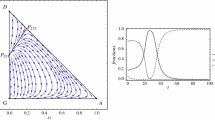Abstract
Two standard assumptions in analytical work on the iterated prisoner's dilemma are that the population is infinite, and that opponents—though randomly selected—are fixed for the duration of the game. This paper explores the consequences of relaxing both assumptions. It is shown in particular that if opponents are drawn at random throughout the game, then stable cooperation via reciprocity requires both that the probability of a further interaction be sufficiently high—higher than when opponents are fixed—and that the population not exceed a certain critical size, which depends on the probability of further interaction.
Similar content being viewed by others
Literature
Axelrod, R. 1984.The Evolution of Cooperation. New York: Basic Books.
Axelrod, R. and D. Dion. 1988. The further evolution of cooperation.Science 242, 1385–1390.
Borštnik, B., D. Pumpernik, I. L. Hofacker and G. L. Hofacker. 1990. An ESS-analysis for ensembles of prisoner's dilemma's strategies.J. theor. Biol. 142, 189–200.
Boyd, R. and J. P. Lorberbaum. 1987. No pure strategy is evolutionarily stable in the repeated prisoner's dilemma game.Nature 327, 58–59.
Boyd, R. and P. J. Richerson. 1988. The evolution of reciprocity in sizable groups.J. theor. Biol. 132, 337–356.
Clark, C. W. 1981. Bioeconomics of the ocean.BioScience 31, 231–237.
Clark, C. W. 1990.Mathematical Bioeconomics: the Optimal Management of Renewable Resources, 2nd Edition. New York: John Wiley.
Dawkins, R. 1989.The Selfish Gene, 2nd Edition. Oxford: Oxford University Press.
Dugatkin, L. A. and M. Alfieri. 1991. Guppies and the TIT for TAT strategy: Preference based on past interaction.Behav. Ecol. Sociobiol. 28, 243–246.
Farrell, J. and R. Ware. 1989. Evolutionary stability in the repeated Prisoner's Dilemma.Theor. Pop. Biol. 36, 161–166.
May, R. M. 1981. The evolution of cooperation.Nature 292, 291–292.
May, R. M. 1987. More evolution of cooperation.Nature 327, 15–17.
Maynard Smith, J. 1982.Evolution and the Theory of Games. Cambridge: Cambridge University Press.
Mesterton-Gibbons, M. 1991. An escape from the prisoner's dilemma.J. math. Biol. 29, 251–269.
Mesterton-Gibbons, M. 1992.An Introduction to Game-theoretic Modelling. Redwood City, California: Addison-Wesley.
Milinski, M., D. Pfluger, D. Külling and R. Kettler. 1990. Do sticklebacks cooperate repeatedly in reciprocal pairs?Behav. Ecol. Sociobiol. 27, 17–21.
Nowak, M. 1990. Stochastic strategies in the prisoner's dilemma.Theor. Pop. Biol. 38, 93–112.
Nowak, M. and K. Sigmund. 1989. Game-dynamical aspects of the prisoner's dilemma.Appl. math. Comp. 30, 191–213.
Nowak, M. and K. Sigmund. 1990. The evolution of stochastic strategies in the prisoner's dilemma.Acta. appl. Math. 20, 247–265.
Schelling, T. C. 1978.Micromotives and Macrobehavior. New York: Norton.
Taylor, P. and L. Jonker. 1978. Evolutionarily stable strategies and game dynamics.Math. Biosci. 40, 145–156.
Author information
Authors and Affiliations
Rights and permissions
About this article
Cite this article
Mesterton-Gibbons, M. On the iterated prisoner's dilemma in a finite population. Bltn Mathcal Biology 54, 423–443 (1992). https://doi.org/10.1007/BF02464842
Received:
Revised:
Issue Date:
DOI: https://doi.org/10.1007/BF02464842




